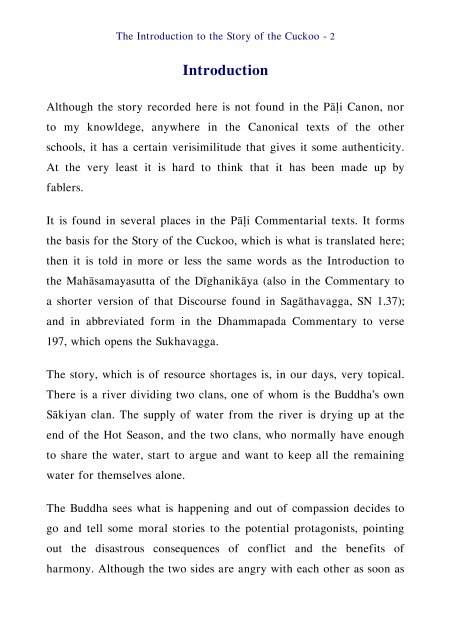The Introduction to the Story of the Cuckoo or: The Buddha goes to War
An English translation of this Jātaka story which describes the Buddha’s teachings about resource shortage and war (from Kuṇālajātakavaṇṇanā, Jā 536).
An English translation of this Jātaka story which describes the Buddha’s teachings about resource shortage and war (from Kuṇālajātakavaṇṇanā, Jā 536).
Create successful ePaper yourself
Turn your PDF publications into a flip-book with our unique Google optimized e-Paper software.
<strong>The</strong> <strong>Introduction</strong> <strong>to</strong> <strong>the</strong> S<strong>to</strong>ry <strong>of</strong> <strong>the</strong> <strong>Cuckoo</strong> - 2<br />
<strong>Introduction</strong><br />
Although <strong>the</strong> s<strong>to</strong>ry rec<strong>or</strong>ded here is not found in <strong>the</strong> Pāḷi Canon, n<strong>or</strong><br />
<strong>to</strong> my knowldege, anywhere in <strong>the</strong> Canonical texts <strong>of</strong> <strong>the</strong> o<strong>the</strong>r<br />
schools, it has a certain verisimilitude that gives it some au<strong>the</strong>nticity.<br />
At <strong>the</strong> very least it is hard <strong>to</strong> think that it has been made up by<br />
fablers.<br />
It is found in several places in <strong>the</strong> Pāḷi Commentarial texts. It f<strong>or</strong>ms<br />
<strong>the</strong> basis f<strong>or</strong> <strong>the</strong> S<strong>to</strong>ry <strong>of</strong> <strong>the</strong> <strong>Cuckoo</strong>, which is what is translated here;<br />
<strong>the</strong>n it is <strong>to</strong>ld in m<strong>or</strong>e <strong>or</strong> less <strong>the</strong> same w<strong>or</strong>ds as <strong>the</strong> <strong>Introduction</strong> <strong>to</strong><br />
<strong>the</strong> Mahāsamayasutta <strong>of</strong> <strong>the</strong> Dīghanikāya (also in <strong>the</strong> Commentary <strong>to</strong><br />
a sh<strong>or</strong>ter version <strong>of</strong> that Discourse found in Sagāthavagga, SN 1.37);<br />
and in abbreviated f<strong>or</strong>m in <strong>the</strong> Dhammapada Commentary <strong>to</strong> verse<br />
197, which opens <strong>the</strong> Sukhavagga.<br />
<strong>The</strong> s<strong>to</strong>ry, which is <strong>of</strong> resource sh<strong>or</strong>tages is, in our days, very <strong>to</strong>pical.<br />
<strong>The</strong>re is a river dividing two clans, one <strong>of</strong> whom is <strong>the</strong> <strong>Buddha</strong>’s own<br />
Sākiyan clan. <strong>The</strong> supply <strong>of</strong> water from <strong>the</strong> river is drying up at <strong>the</strong><br />
end <strong>of</strong> <strong>the</strong> Hot Season, and <strong>the</strong> two clans, who n<strong>or</strong>mally have enough<br />
<strong>to</strong> share <strong>the</strong> water, start <strong>to</strong> argue and want <strong>to</strong> keep all <strong>the</strong> remaining<br />
water f<strong>or</strong> <strong>the</strong>mselves alone.<br />
<strong>The</strong> <strong>Buddha</strong> sees what is happening and out <strong>of</strong> compassion decides <strong>to</strong><br />
go and tell some m<strong>or</strong>al s<strong>to</strong>ries <strong>to</strong> <strong>the</strong> potential protagonists, pointing<br />
out <strong>the</strong> disastrous consequences <strong>of</strong> conflict and <strong>the</strong> benefits <strong>of</strong><br />
harmony. Although <strong>the</strong> two sides are angry with each o<strong>the</strong>r as soon as


















